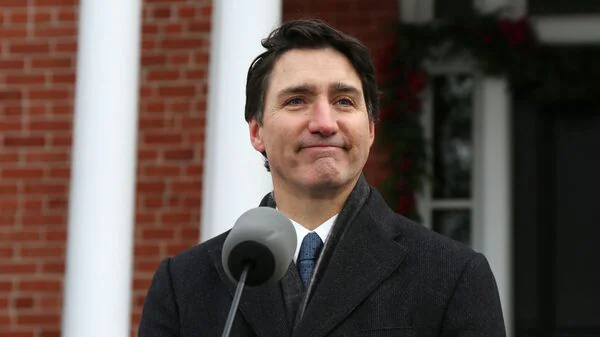Canada Hits Back with 25% Tariffs in Escalating Trade War with US

A new chapter in the ongoing trade tensions between Canada and the United States has begun, as Canada imposes retaliatory tariffs on American goods.
Prime Minister Justin Trudeau announced a sweeping 25% tariff targeting $155 billion CAD ($106.6 billion USD) worth of US imports, covering a broad range of products, including beer, wine, household appliances, and sporting goods. This move comes in response to US President Donald Trump’s decision to levy a 25% tariff on Canadian and Mexican imports, along with an additional 10% on Chinese goods, citing concerns over illegal immigration and drug trafficking.
Speaking at a late-night press conference on Saturday, Trudeau emphasized that while Canada had not sought this trade conflict, it would not hesitate to defend its economic interests.
“We didn’t want to be in this position, but we will stand up for Canadians,” he declared. However, he warned that the repercussions of the trade war would be felt on both sides of the border.
Under the new policy, $30 billion worth of US goods will face tariffs starting Tuesday, with an additional $125 billion to be affected in the following weeks, allowing Canadian businesses time to adjust.
The Canadian tariffs will affect a wide variety of American exports, including alcoholic beverages like bourbon and wine, fresh produce, perfumes, clothing, footwear, and household items such as furniture and appliances. Additionally, tariffs will extend to lumber and plastic products, while further regulatory actions on critical minerals and government procurement are also under review.
Economists caution that these escalating trade measures could lead to increased prices for consumers, as both nations grapple with the economic fallout.
Trade experts argue that the imposition of tariffs by the US, along with retaliatory measures from Canada, Mexico, and China, will have far-reaching consequences for global markets.
Christopher Sands, Director of the Wilson Center’s Canada Institute, warned that a tit-for-tat tariff battle between the US and Canada could be economically destructive for both nations.
“This is a situation where there will be no winners, only economic hardship for businesses and consumers alike,” he told the BBC.
The United States, Canada, and Mexico share deeply integrated economies, with over $2 billion worth of goods crossing borders daily. Canada is also the largest foreign supplier of crude oil to the US, accounting for 61% of American oil imports last year. However, while most Canadian goods will face a 25% tariff under Trump’s policy, Canadian energy exports will see a comparatively lower 10% levy.
The White House has justified the tariffs as a necessary measure to hold Canada, Mexico, and China accountable for commitments to curb drug trafficking into the US. However, Trudeau rejected the notion that Canada’s border posed a security risk, stating that less than 1% of fentanyl entering the US originates from Canada.
Additionally, Trudeau dismissed claims that illegal immigration through Canada was a significant issue, emphasizing that tariffs were an ineffective means of addressing these concerns.
In response to heightened tensions, Canada has pledged over $1 billion to bolster border security with the US.
Trump has signaled his readiness to escalate tariffs further if Canada and other countries continue to retaliate. Meanwhile, Mark Carney, the former Governor of the Bank of Canada and the Bank of England, warned that these tariffs could significantly damage economic growth and fuel inflation.
“This will harm the US’s global standing and economic stability,” said Carney, who is also being considered as a potential future leader of Canada’s Liberal Party.
As both nations brace for economic uncertainty, the world watches closely to see how this trade standoff unfolds.





